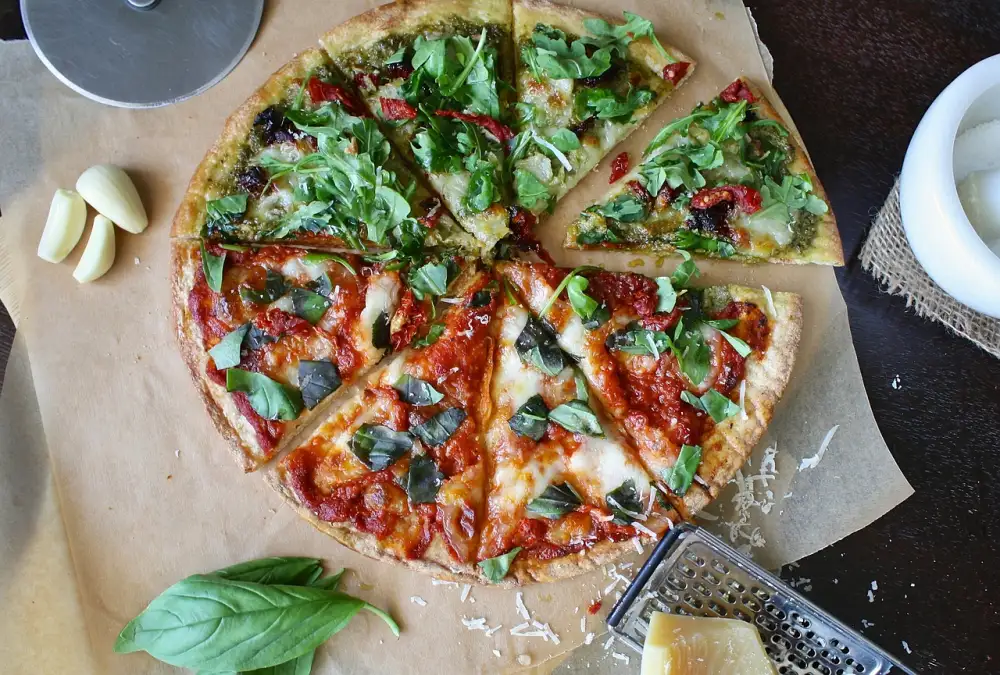Perfecting the Art of Pizza Sauce: A Mouthwatering Recipe for Pizza Lovers

- Importance of Pizza Sauce in Enhancing Flavor
- Key Ingredients for a Delicious Pizza Sauce
- Step-by-Step Recipe for Homemade Pizza Sauce
- Tips for Choosing Store-Bought Pizza Sauce
- Exploring Different Variations of Pizza Sauce
- Pairing Pizza Sauce with Different Pizza Toppings
- Frequently Asked Questions about Pizza Sauce
Pizza, the beloved Italian dish that has captured the hearts and taste buds of people all over the world. From its crispy crust to its gooey cheese and flavorful toppings, pizza is a culinary masterpiece. But what truly takes this dish to another level is the secret ingredient - pizza sauce.
Pizza sauce is the soul of any great pizza. It's what brings all the flavors together and adds that extra punch of deliciousness. Whether you're a fan of classic Margherita or prefer a loaded meat lover's pizza, the right sauce can make all the difference.
In this article, we will delve into the art of perfecting pizza sauce. We'll explore its importance in enhancing flavor, discuss key ingredients for a mouthwatering sauce, provide a step-by-step recipe for homemade sauce, offer tips for choosing store-bought options, and even explore different variations and pairings.
So join us on this culinary journey as we uncover the secrets behind creating the perfect pizza sauce. Get ready to elevate your pizza experience to new heights!
Importance of Pizza Sauce in Enhancing Flavor
Pizza sauce plays a crucial role in enhancing the flavor of this beloved dish. It is the foundation upon which all other toppings and ingredients are built. The sauce provides a burst of tanginess and richness that complements the savory cheese, meats, and vegetables on top. Without a flavorful sauce, a pizza can fall flat and lack depth. The right balance of herbs, spices, and tomatoes in the sauce creates a harmonious blend of flavors that tantalizes the taste buds. Whether it's a classic Margherita or a gourmet creation, the importance of pizza sauce cannot be underestimated in creating an unforgettable dining experience.
Key Ingredients for a Delicious Pizza Sauce
The secret to a mouthwatering pizza sauce lies in the perfect combination of ingredients. Here are the key components that will take your sauce from ordinary to extraordinary:
1. Tomatoes: Choose ripe, juicy tomatoes for the base of your sauce. San Marzano tomatoes are highly recommended for their sweet and tangy flavor.
2. Garlic: Fresh garlic adds a pungent and aromatic element to your sauce. Mince it finely or use a garlic press for maximum flavor.
3. Olive Oil: A good quality olive oil not only adds richness but also helps to bind all the flavors together.
4. Basil: Fresh basil leaves bring a delightful herbaceousness to your sauce. Tear them into small pieces or chop them finely before adding.
5. Oregano: Dried oregano is an essential ingredient that infuses your sauce with earthy and slightly bitter notes.
6. Salt and Pepper: Season your sauce with salt and pepper to taste, enhancing the overall flavor profile.
7. Sugar: A pinch of sugar can help balance out the acidity of the tomatoes, creating a more harmonious taste.
Remember, these ingredients are just the foundation; feel free to experiment with additional herbs and spices to suit your personal preference. The key is finding the right balance of flavors that complements your chosen toppings while allowing the tomato base to shine through.
Step-by-Step Recipe for Homemade Pizza Sauce
Making your own pizza sauce at home is not only easy but also allows you to customize the flavors according to your preferences. Follow these simple steps to create a delicious homemade pizza sauce:
1. Gather the ingredients: You will need 2 cups of crushed tomatoes, 2 cloves of garlic (minced), 1 tablespoon of olive oil, 1 teaspoon of dried oregano, 1 teaspoon of dried basil, 1/2 teaspoon of sugar, salt and pepper to taste.
2. Heat the olive oil in a saucepan over medium heat. Add the minced garlic and sauté until fragrant.
3. Pour in the crushed tomatoes and stir well. Reduce the heat to low and let it simmer for about 10 minutes.
4. Add the dried oregano, dried basil, sugar, salt, and pepper to the saucepan. Stir everything together and let it simmer for another 5 minutes.
5. Taste the sauce and adjust the seasoning if needed. If you prefer a smoother consistency, you can use an immersion blender or regular blender to puree the sauce.
6. Once done, remove from heat and let it cool before using it as a topping on your favorite pizza dough.
By following these steps, you can easily make a flavorful homemade pizza sauce that will take your pizza game to a whole new level!
Tips for Choosing Store-Bought Pizza Sauce
When it comes to choosing store-bought pizza sauce, there are a few tips to keep in mind. First and foremost, read the ingredients list carefully. Look for sauces that use high-quality tomatoes and natural seasonings. Avoid sauces that contain artificial flavors or preservatives.
Next, consider the consistency of the sauce. Some prefer a thick and chunky sauce, while others prefer a smoother texture. Choose based on your personal preference and the type of pizza you plan to make.
Another important factor to consider is the level of spiciness. Some pizza sauces have a mild flavor, while others have a kick of heat. Think about your taste preferences and choose accordingly.
Additionally, pay attention to the brand reputation. Look for well-known brands that have positive reviews from customers. This can be an indicator of quality and taste.
Lastly, don't be afraid to experiment with different brands and flavors until you find one that suits your palate. Everyone has different preferences when it comes to pizza sauce, so take your time in finding the perfect match for your homemade pizzas.
By following these tips, you can ensure that you choose a store-bought pizza sauce that enhances the flavors of your pizzas and elevates your culinary experience.
Exploring Different Variations of Pizza Sauce
While a classic tomato-based pizza sauce is the go-to choice for many pizza lovers, there are numerous variations that can take your pizza game to a whole new level. Experimenting with different flavors and ingredients can add an exciting twist to your favorite dish.
One popular variation is the white pizza sauce, which replaces the traditional tomato base with a creamy mixture of garlic, olive oil, and cheese. This rich and indulgent sauce pairs perfectly with toppings like spinach, mushrooms, and caramelized onions.
For those who prefer a tangy and slightly sweet flavor profile, barbecue sauce makes an excellent alternative. Its smoky undertones complement toppings such as grilled chicken, red onions, and pineapple. The combination of barbecue sauce and melted cheese creates a mouthwatering fusion of flavors.
If you're feeling adventurous, try experimenting with pesto sauce as your pizza base. Made from fresh basil leaves, pine nuts, garlic, Parmesan cheese, and olive oil, pesto adds a burst of freshness to your pizza. Pair it with toppings like sun-dried tomatoes, mozzarella cheese, and grilled vegetables for a vibrant and flavorful experience.
For those who crave heat and spice, hot sauce or buffalo sauce can be used as a unique pizza base. These sauces provide a fiery kick that complements toppings such as spicy sausage, jalapenos, and pepperoni. Be sure to balance the heat with cooling ingredients like blue cheese or ranch dressing.
Don't limit yourself to just one type of pizza sauce - mix it up! Combining different sauces on the same pie can create a symphony of flavors that will tantalize your taste buds. For example, try spreading half of your crust with classic tomato sauce and the other half with white garlic sauce for a delicious contrast.
Remember to adjust cooking times accordingly when using alternative sauces as they may have different moisture levels compared to traditional tomato-based options. With a little creativity and experimentation, you can create unique and unforgettable pizza experiences with different variations of pizza sauce.
Pairing Pizza Sauce with Different Pizza Toppings
The beauty of pizza lies in its versatility, allowing you to experiment with various toppings and flavors. But the key to creating a truly mouthwatering pizza is finding the perfect sauce to complement your chosen toppings. Here are some delicious pairing ideas to take your pizza experience to the next level.
1. Margherita Pizza: The classic combination of fresh mozzarella, tomatoes, and basil calls for a simple yet flavorful sauce. A traditional tomato-based sauce with garlic and oregano will enhance the natural sweetness of the tomatoes and add depth to this timeless favorite.
2. Pepperoni Pizza: The spicy kick of pepperoni demands a robust sauce that can hold its own against the bold flavors. Opt for a slightly tangy tomato sauce with hints of red pepper flakes or chili powder to balance out the richness of the pepperoni.
3. BBQ Chicken Pizza: For those who crave a smoky and tangy flavor profile, a barbecue sauce as the base is an excellent choice. Its sweet and savory notes perfectly complement grilled chicken, red onions, and cilantro, creating a tantalizing taste sensation.
4. Vegetarian Pizza: When it comes to vegetarian pizzas loaded with colorful veggies like bell peppers, mushrooms, spinach, and olives, a versatile marinara sauce works wonders. Its robust flavor enhances the earthiness of the vegetables while providing a harmonious backdrop for all those vibrant toppings.
5. White Pizza: Skip the tomato-based sauces altogether and opt for a creamy white sauce made from garlic-infused olive oil or Alfredo sauce instead. This luxurious base pairs beautifully with toppings like roasted garlic, caramelized onions, artichoke hearts, and feta cheese.
Remember that experimenting with different combinations is part of the fun! Don't be afraid to get creative by mixing and matching sauces with various toppings until you find your perfect flavor harmony on every slice.
Frequently Asked Questions about Pizza Sauce
1. Can I use any type of tomatoes for pizza sauce?
It is recommended to use San Marzano tomatoes for the best flavor and texture. However, you can also use canned crushed tomatoes or tomato puree.
2. How long does homemade pizza sauce last?
Homemade pizza sauce can be stored in an airtight container in the refrigerator for up to one week. It can also be frozen for up to three months.
3. Can I adjust the spice level of the pizza sauce?
Absolutely! You can add more or less red pepper flakes, garlic, or other spices to suit your taste preferences.
4. Can I make a vegan or vegetarian pizza sauce?
Yes, you can easily make a vegan or vegetarian pizza sauce by omitting any meat-based ingredients and using vegetable broth instead of chicken broth.
5. Can I substitute dried herbs for fresh herbs in the recipe?
Yes, you can substitute dried herbs for fresh herbs, but keep in mind that dried herbs are more concentrated in flavor. Use about half the amount of dried herbs as you would fresh herbs.
6. Can I use pizza sauce as a dipping sauce?
Definitely! Pizza sauce makes a delicious dipping sauce for breadsticks, mozzarella sticks, or even vegetables.
7. What if my pizza sauce turns out too watery?
If your pizza sauce is too watery, simmer it uncovered on low heat until it thickens to your desired consistency.
8. Can I freeze store-bought pizza sauce?
Yes, most store-bought pizza sauces can be frozen in their original containers or transferred to freezer-safe bags or containers.
Remember that experimenting with different ingredients and techniques will help you find your perfect pizza sauce recipe!
In conclusion, the perfect pizza sauce is the key to taking your pizza experience to new heights. Whether you choose to make it from scratch or opt for a store-bought version, the sauce plays a vital role in enhancing the flavors of your pizza.
By using high-quality ingredients and following a tried-and-true recipe, you can create a mouthwatering homemade pizza sauce that will leave your taste buds craving more. Don't be afraid to experiment with different variations of pizza sauce to find your own unique flavor profile.
When it comes to pairing pizza sauce with toppings, the possibilities are endless. From classic margherita to bold and spicy combinations, the right sauce can complement and elevate any combination of toppings.
If you're short on time or prefer convenience, there are also excellent store-bought options available. Just remember to read labels and choose sauces made with real ingredients and minimal additives.
So why settle for mediocre when you can have extraordinary? Take your pizza game up a notch by perfecting the art of pizza sauce. With its ability to enhance flavors and create a harmonious balance of tastes, the perfect sauce will undoubtedly elevate your pizza experience and leave you craving more. So go ahead, get saucy, and enjoy every delicious bite!
Published: 21. 11. 2023
Category: Food



